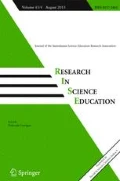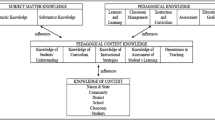Abstract
The purpose of this study was to rethink the conceptualization of pedagogical content knowledge based on our descriptive research findings and to show how this new conceptualization helps us to understand teachers as professionals. This study was a multiple case study grounded in a social constructivist framework. Data were collected from multiple sources and analysed using three approaches: (a) constant comparative method, (b) enumerative approach, and (c) in-depth analysis of explicit PCK. The results indicated that (a) PCK was developed through reflection-in-action and reflection-on-action within given instructional contexts, (b) teacher efficacy emerged as an affective affiliate of PCK, (c) students had an important impact on PCK development, (d) students’ misconceptions played a significant role in shaping PCK, and (e) PCK was idiosyncratic in some aspects of its enactment. Discussion centres on how these five aspects are related to teacher professionalism.


Similar content being viewed by others
References
American Association for the Advancement of Science (AAAS) (1993). Benchmarks for scientific literacy. Washington, DC: AAAS.
Appleton, K. (2006). Science pedagogical content knowledge and elementary school teachers. In K. Appleton (Ed.), Elementary science teacher education: International perspectives on contemporary issues and practice (pp. 31–54). Mahwah, NJ: Lawrence Erlbaum Associates, Publishers.
Argyris, C., & Schon, D. A. (1974). Theory in practice: Increasing professional effectiveness. San Francisco: Jossey-Bass.
Ball, D. L. (1990). The mathematical understandings that preservice teachers bring to teacher education. Elementary School Journal, 90(4), 449–466.
Bandura, A. (1986). Social foundations of thought and action: A social cognitive theory. Upper Saddle River, NJ: Prentice-Hall.
Baxter, J. A., & Lederman, N. G. (1999). Assessment and measurement of pedagogical content knowledge. In J. Gess-Newsome & N. G. Lederman (Eds.), Examining pedagogical content knowledge (pp.147–161). Dordrecht, The Netherlands: Kluwer.
Borko, H., & Putnam, R. T. (1996). Learning to teach. In D. C. Berliner & R. C. Calfee (Eds.), Handbook of educational psychology (pp. 673–708). New York: Macmillan.
Brookhart, S. M., & Freeman, D. J. (1992). Characteristics of entering teacher candidates. Review of Educational Research, 62(1), 37–60.
Bullough, R. V., Jr. (2001). Pedagogical content knowledge circa 1907 and 1987: A study in the history of an idea. Teaching and Teacher Education, 17, 655–666.
Calderhead, J. (1996). Teachers: Beliefs and knowledge. In D. C. Berliner & R. C. Calfee (Eds.), Handbook of educational psychology (pp. 709–725). New York: Macmillan.
Carter, K. (1990). Teachers’ knowledge and learning to teach. In W. R. Houston & M. H. J. Sikula (Eds.), Handbook of research on teacher education (pp. 291–310). New York: Macmillan.
Charmaz, K. (2000). Grounded theory: Objectivist and constructivist methods. In N. Denzin & Y. S. Lincoln (Eds.), Handbook of qualitative research (2nd ed., pp. 509–535). Thousand Oaks, CA: Sage.
Cochran, K. F., DeRuiter, J. A., & King, R. A. (1993). Pedagogical content knowledge: An integrative model for teacher preparation. Journal of Teacher Education, 44, 263–272.
Denzin, N. K. (1978). The research act: A theoretical introduction to sociological methods (2nd edn.). New York: McGraw-Hill.
Dewey, J. (1902/1983). The child and the curriculum. In J. A. Boydston (Ed.), John Dewey: The middle works, 1899–1924: Vol. 2: 1902–1903. Carbondale, IL: Southern Illinois University Press.
Donnelly, J. F. (2001). School science teaching as a profession: Past, present, and future. School Science Review, 82(300), 31–39.
Elbaz, F. (1983). Teacher thinking: A study of practical knowledge. London: Croom Helm.
Eraut, M. (1994). Developing professional knowledge and competence. London: Falmer Press.
Fernandez-Balboa, J. M., & Stiehl, J. (1995). The generic nature of pedagogical content knowledge among college professors. Teaching and Teacher Education, 11(3), 293–306.
Geddis, A. N., Onslow, B., Beynon, C., & Oesch, J. (1993). Transforming content knowledge: Learning to teach about isotopes. Science Education, 77(6), 575–591.
Grossman, P. L. (1990). The making of a teacher: Teacher knowledge and teacher education. New York: Teachers College Press.
Guskey, T. (1988). Teacher efficacy, self-concept, and attitudes toward the implementation of instructional innovation. Teaching and Teacher Education, 4(1), 63–69.
Hashweh, M. Z. (2005). Teacher pedagogical constructions: a reconfiguration of pedagogical content knowledge. Teachers and Teaching: Theory and Practice, 11(3), 273–292.
Janesick, V. J. (1994). The dance of qualitative research design. In N. K. Denzin & Y. S. Lincoln (Eds.), Handbook of qualitative research design (pp. 209–219). Thousand Oaks, CA: Sage.
Kagan, D. M. (1990). Ways of evaluating teacher cognition: Inferences concerning the Goldilocks Principle. Review of Educational Research, 60(3), 419–469.
Kagan, D. M. (1992). Implications of research on teacher belief. Educational Psychologist, 27(1), 65–90.
LeCompte, M. D., & Preissle, J. (Eds.) (1993). Analysis and interpretation of qualitative data. In Ethnography and qualitative design in educational research (2nd ed., pp. 234–278). San Diego, CA: Academic Press.
Leinhardt, G., & Smith, D. (1985). Expertise in mathematics instruction: Subject matter knowledge. Journal of Educational Psychology, 77(3), 247–271.
Loughran, J., Berry, A., & Mulhall, P. (2006). Understanding and developing science teachers’ pedagogical content knowledge. Rotterdam, The Netherlands: Sense Publishers.
Magnusson, S., Krajcik, L., & Borko, H. (1999). Nature, sources and development of pedagogical content knowledge. In J. Gess-Newsome & N. G. Lederman (Eds.), Examining pedagogical content knowledge (pp. 95–132). Dordrecht, The Netherlands: Kluwer.
Marks, R. (1990). Pedagogical content knowledge: From a mathematical case to a modified conception. Journal of Teacher Education, 41, 3–11.
National Research Council (NRC) (1996). National science education standards. Washington, DC: National Academy Press.
Nespor, J. (1987). The role of beliefs in the practice of teaching. Journal of Curriculum Studies, 19(4), 317–328.
Novak, J. D. (1993). How do we learn our lessons? The Science Teacher, 60(3), 50–55.
Pajares, F. (1992). Teachers beliefs and educational research: Cleaning up a messy construct. Review of Educational Research, 62, 307–332.
Richardson, V. (1996). The role of attitudes and beliefs in learning to teach. In J. Sikula, T. J. Buttery, & E. Guyton (Eds.), Handbook of research on teacher education (2nd ed., pp. 102–119). New York: Macmillan.
Ross, J. A. (1995). Strategies for enhancing teachers’ beliefs in their effectiveness: Research on a school improvement hypothesis. Teachers College Record, 97, 227–251.
Schon, D. A. (1983). The reflective practitioner. New York: Basic Books.
Schon, D. A. (1987). Educating the reflective practitioner: Toward a new design for teaching and learning in the professions. San Francisco: Jossey-Bass.
Shulman, L. (1986). Those who understand: Knowledge growth in teaching. Educational Researcher, 15(1), 4–14.
Shulman, L. (1987). Knowledge and teaching: Foundations of the new reform. Harvard Educational Review, 57(1), 1–22.
Smith, D. C., & Neale, D. C. (1989). The construction of subject matter knowledge in primary science teaching. Teaching and Teacher Education, 5, 1–20.
Stein, M. K., & Wang, M. C. (1988). Teacher development and school improvement: The process of teacher change. Teaching and Teacher Education, 4, 171–187.
Tamir, P. (1988). Subject matter and related pedagogical knowledge in teacher education. Teaching and Teacher Education, 4, 99–110.
Tournaki, N., & Podell, D. M. (2005). The impact of student characteristics and teacher efficacy on teachers’ predictions of student success. Teaching and Teacher Education, 21, 299–314.
Van Driel, J. H., Verloop, N., & De Vos, W. (1998). Developing science teachers’ pedagogical content knowledge. Journal of Research in Science Teaching, 35, 673–695.
Veal, W. R., & MaKinster, J. G. (1999). Pedagogical content knowledge taxonomies. Electronic Journal of Science Education, 3(4). Retrieved February, 26, 2003, from http://unr.edu/homepage/crowther/ejse/vealmak.html.
Wilson, S. M., Shulman, L. S., & Richert, E. R. (1987). ‘150 different ways’ of knowing: Representations of knowledge in teaching. In J. Calderhead (Ed.), Exploring teachers’ thinking (pp. 104–124). New York: Taylor and Francis.
Woolfolk, A. E., Rosoff, B., & Hoy, W. K. (1990). Teachers’ sense of efficacy and their beliefs about managing students. Teaching and Teacher Education, 6, 137–148.
Acknowledgment
This research was supported by a grant from the Department of Education. However, the contents of this article do not necessarily represent the policy of the Department of Education, and you should not assume endorsement by the US Federal Government.
Author information
Authors and Affiliations
Corresponding author
Appendices
Appendix A
PCK Evidence Reporting Table

Appendix B
An Example of the In-depth Analysis of Explicit PCK
Lucy; AP chemistry; Crime lab (to identify unknown compounds found in a scene of crime)

Orientation to ST Orientation to science teaching; K of As knowledge of assessment; K of SC knowledge of science curriculum; K of SU knowledge of student understanding; K of IS/R knowledge of instructional strategies and representations
Rights and permissions
About this article
Cite this article
Park, S., Oliver, J.S. Revisiting the Conceptualisation of Pedagogical Content Knowledge (PCK): PCK as a Conceptual Tool to Understand Teachers as Professionals. Res Sci Educ 38, 261–284 (2008). https://doi.org/10.1007/s11165-007-9049-6
Received:
Accepted:
Published:
Issue Date:
DOI: https://doi.org/10.1007/s11165-007-9049-6




